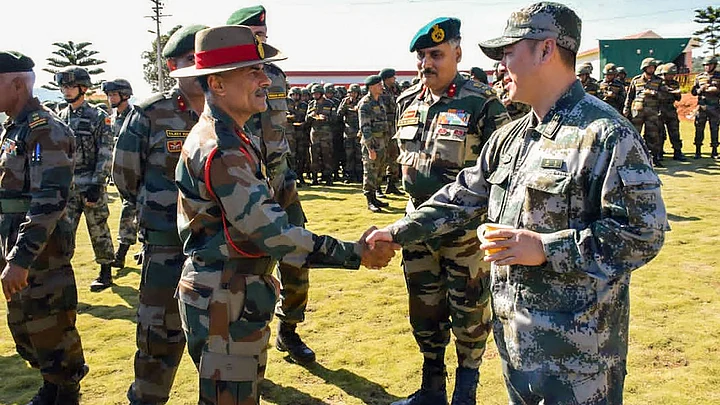Indian and Chinese militaries began their joint exercise in this northeastern state of Meghalaya on Saturday, 7 December.
The annual exercise “Hand-in-Hand” 2019, with the theme of counter-terrorism under a United Nations mandate, is scheduled to be conducted at the state-of-the-art Joint Training Node at Umroi Cantonment, about 25 km from Shillong, will conclude on 20 December.
A total of 130 troopers of the People's Liberation Army led by Colonel Hu Chunguang of 1st Infantry Battalion, Tibet's military command and the Indian contingent is led by Colonel K.J. Singh are taking part in the eighth edition of the exercise between the strong armies.
"The exercise this year is special as it is 70th year of diplomatic ties between India and China. It will demonstrates the historic relationship between two countries and helps in growing bilateral relations," General Officer Commanding Red Horns Division, Major General Deepak Mehra, said.
“It will further deepen people to people interaction between academics, forces, youths organisations and political class of both the countries.”General Officer Commanding Red Horns Division, Major General Deepak Mehra
Moreover, he said a stable and balanced relationship between two countries will be beneficial for people of both the countries.
"Both counties have agreed to maintenance peace and tranquility at the border as it is essential for development of both the countries," Mehra said.
During the 14-day exercise, the Indian and Chinese armies will be engaged in a joint military exercise that will involve tactical-level operations in a semi-urban terrain for an international counter-terrorist operation.
The focus of the initial four days of the exercise will be on orientation to training area, lectures on counter insurgency, counter terrorism environment, firing by each others weapons, improvised explosive devices drills.
This exercise will cover company level joint training on counter terrorism operation in semi urban terrain under United Nations mandate.
"We would surely learn from each other's practice and evolve practice and drills besides rehearsing established joint command and control structures," Colonel Singh said.
"The terminal aim is to evolve and develop high degree common combat compatibility and synergy to be able to conduct successful counter terrorism operations in future," he said.
Echoing his Indian counterpart, Colonel Chunguang said that two contingents will learn different tactics together to improve counter terrorism capability.
"It is through this and through this exercise, they would deepen their friendship and improve mutual understanding," Chunguang said.
(At The Quint, we question everything. Play an active role in shaping our journalism by becoming a member today.)
